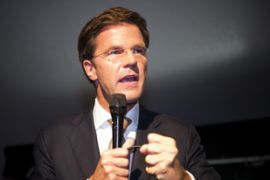Centre-right lead in Dutch vote
Liberal party claims narrow victory while anti-immigration party makes major gains.

The Reuters news agency reported that the VVD had already began informal
coalition talks.
‘Anti-immigration’ boost
Thursday’s results showed the VVD won 31 seats in the 150-seat parliament, just ahead of the 30 seats won by the left-leaning Labour Party (PvdA) of Job Cohen, the former mayor of Amsterdam.
“It appears as if for the first time in our history the VVD has become the largest party in the Netherlands,” Rutte, who campaigned on the need for deep spending cuts, said in an address to his supporters.
| in depth | |||||
|
Voters also gave a major boost to the anti-immigration Freedom Party (PVV) of Geert Wilders, which claimed 24 seats and could hope to enter a coalition government.
In the previous 2006 general election, the first time the party stood for parliament, the PVV took nine seats.
“The impossible has happened,” Wilders told his supporters.
“We are the biggest winner today. The Netherlands chose more security, less crime, less immigration and less Islam.”
The Labour leader remained positive despite preliminary results, saying the vote could still “go either way”.
The official results will not be declared until June 15, when all overseas votes have also been counted.
As with all post-war Dutch governments, the winners will have to form a coalition to ensure a parliamentary majority of at least 76 seats.
Under the Dutch constitution, party leaders will next visit Queen Beatrix lon Thursday to inform her of their coalition preferences – the start of a long negotiating process.
The most likely outcome appears to be a centrist coalition with VVD and Labour combining with two smaller parties on the left, the Green-Left and Democrats-66.
Polarising stances
In theory, Wilders and his Freedom Party could play a role, but his polarising stances have made him unpopular to other parties.
Wilders booked major gains in municipal elections earlier this year with ideas such a tax on headscarves worn by Muslim women.
But his popularity faded slightly ahead of the elections as he was unable to deliver on that promise and attention shifted to the European financial crisis.
Wilders said he was willing to accept compromises in order to enter a cabinet.
However, speaking to Al Jazeera from Amsterdam, Frits Wester, a political journalist, said that he thought such a scenario was unlikely.
“There’s no party who really wants to form a coalition with the party of Geert Wilders,” Wester said.
“His expressions about the Islam, his criticism of the Islam, is too extreme for the Netherlands, so no party is really willing to form a coalition with him.
“And also his solutions for the financial crisis are a little bit old fashioned, so I don’t think he will be part of the next coalition.”
